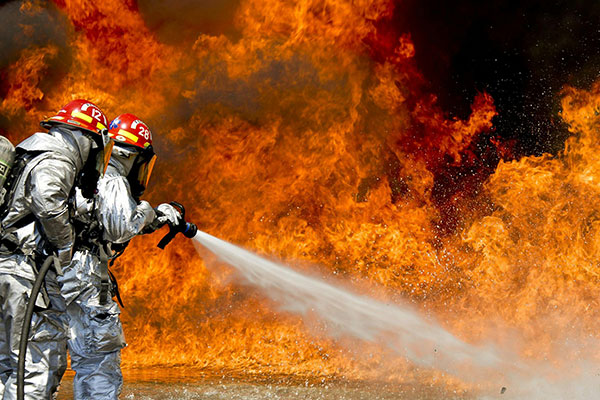PARTAC – Initial & Refresher
COURSE DURATION: 5 Days Training. 3 Days – Refresher (Covers all topics summarized)
PREREQUISITE: AVOP – Airside Vehicle Operators Permit
COURSE DEPLOYMENT: Classroom / Virtual
TARGET GROUP: Aviation Fire Fighters
COURSE AIM: The aim of this is course is to enable the participants understand and use the correct aviation phraseology when operating in the maneuvering area.
COURSE OBJECTIVES - UPON COMPLETION OF THIS COURSE, PARTICIPANTS WILL BE ABLE TO:
PASS MARK: 75%
AMOUNT: (PER LEARNER; PER DAY): R3199 (Excl. VAT)
REFRESHER AMOUNT: (PER DAY; PER LEARNER) R2272 (Excl. VAT)
MODULE 1 : GENERAL OPERATING PROCEDURES
MODULE 2 : SPEECH TECHNIQUE
MODULE 3 : RADIOTELEPHONY CALLSIGNS
MODULE 4 : COMMUNICATION WITH GROUND VEHICLE OPERATORS
MODULE 5 : CONTROL OF SURFACE TRAFFIC
MODULE 6 : SPEEDS
MODULE 7 : BIRD AND WILDLIFE CONTROL
MODULE 8 : EMERGENCIES
MODULE 9 : RUNWAY VISUAL RANGE (RVR)
MODULE 10 : LOW VISIBILITY OPERATIONS (LVO)
MODULE 11 : JETBLAST AND PROPWASH HAZARDS
MODULE 12 : RUNWAY AND TAXIWAY MARKINGS
MODULE 13 : SURFACE MARKINGS
MODULE 14 : APRONS MARKINGS
MODULE 15 : SIGNAGE
MODULE 16 : MISCELLANEOUS GROUND MARKINGS
MODULE 17 : INSPECTION OF RUNWAYS
MODULE 18 : PREVENTING RUNWAY INCURSIONS
PREREQUISITE: AVOP – Airside Vehicle Operators Permit
COURSE DEPLOYMENT: Classroom / Virtual
TARGET GROUP: Aviation Fire Fighters
COURSE AIM: The aim of this is course is to enable the participants understand and use the correct aviation phraseology when operating in the maneuvering area.
COURSE OBJECTIVES - UPON COMPLETION OF THIS COURSE, PARTICIPANTS WILL BE ABLE TO:
- Communicate with Pilots and ATC
- Apply learnt rules and behaviors when entering the maneuvering areas
- Apply safety principles to avoid incursions
PASS MARK: 75%
AMOUNT: (PER LEARNER; PER DAY): R3199 (Excl. VAT)
REFRESHER AMOUNT: (PER DAY; PER LEARNER) R2272 (Excl. VAT)
MODULE 1 : GENERAL OPERATING PROCEDURES
- General Operating Procedures:
- Introduction
- Who, why and when we use radiotelephony language?
MODULE 2 : SPEECH TECHNIQUE
- General
- Radiotelephone
- Phonetic language
- Numerals
- Time
- Standard speech abbreviations
MODULE 3 : RADIOTELEPHONY CALLSIGNS
- Airside callsigns
- Aircraft callsigns
- Callsigns confusion
MODULE 4 : COMMUNICATION WITH GROUND VEHICLE OPERATORS
- Establishment of contact
- Continuation of communication
- Standard phrases
- Acknowledgement of messages
- Airside read back of messages
- Conditional clearance
- Test transmissions
MODULE 5 : CONTROL OF SURFACE TRAFFIC
- Prior to transmitting
- Priority on the maneuvering area
- Crossing runways
- Stopbars
MODULE 6 : SPEEDS
- Speed limit as per local aerodrome regulations
MODULE 7 : BIRD AND WILDLIFE CONTROL
- Bird control at airports
MODULE 8 : EMERGENCIES
- Radio failure on the maneuvering area
- Becoming lost/uncertain of position on the maneuvering area
- Vehicle breakdown on the maneuvering area
MODULE 9 : RUNWAY VISUAL RANGE (RVR)
- Observing techniques
MODULE 10 : LOW VISIBILITY OPERATIONS (LVO)
- Apply and adopt the Low Visibility Operations SOP’s
- Control of aerodrome surface traffic in conditions of low visibility
MODULE 11 : JETBLAST AND PROPWASH HAZARDS
- How to maintain safe distance behind a taxiing aircraft
- How to maintain safe distance from the propwash
MODULE 12 : RUNWAY AND TAXIWAY MARKINGS
- Day markings
- Night markings
- Stop bars and lead-on lights
- Runway guard lights
MODULE 13 : SURFACE MARKINGS
- Understanding different surface markings
- Understanding meanings of colors
MODULE 14 : APRONS MARKINGS
- Understanding different apron markings
- Understanding meanings of colors
MODULE 15 : SIGNAGE
- Understanding how to interpret different signage on the airfield
- Understanding different signage categories e.g., mandatory, warning, etc.
MODULE 16 : MISCELLANEOUS GROUND MARKINGS
- Understanding how to interpret different ground markings
MODULE 17 : INSPECTION OF RUNWAYS
- How to perform a runway inspection
- How to follow instructions from the ATC
- How to do a read back to the ATC instruction
MODULE 18 : PREVENTING RUNWAY INCURSIONS
- Situational awareness
- General runway incursion prevention

